Untouchables News.by Sivaji.22.03.2024.Thanks.
Madhya Pradesh Love Jihad: Ali poses as Deepak Chauhan, allegedly rapes and coerces married Dalit woman into conversion
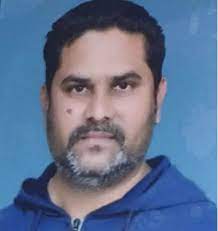
The victim, who eventually gave birth to Ali’s child, filed a complaint against him on March 13 at the Jhabua police station with the assistance of local Bajrang Dal activists
In a disturbing incident of alleged love jihad, Ahmed Ali, son of Irshad Ali from Kailash Marg, Jhabua, stands accused of luring a married Dalit woman from Mandleshwar town, Khargone district, under false pretences. Ali purportedly posed as a Hindu and promised marriage to the woman but instead raped her and demanded her conversion to Islam. The victim, who eventually gave birth to Ali’s child, filed a complaint against him on March 13 at the Jhabua police station with the assistance of local Bajrang Dal activists.
The accused has been booked under sections 366, 376, 376(2)(N), and 506 of the Indian Penal Code, along with sections 3(2)(V) and 3(1)(W)(I) of the Scheduled Caste and Scheduled Tribe (Prevention of Atrocities) Act. The case has been transferred to the Mandleshwar authorities
According to the complaint, the victim, engaged in religious activities like tying threads, met Ali when he visited her residence on January 7, last year, posing as Deepak Chauhan. They exchanged contact information and developed a relationship, eventually discussing marriage. Ali took her to Jhabua on February 26, where he works as an assistant in the Public Works Department, and sexually exploited her while residing in a government quarter.
Despite promises of marriage, Ali did not formalise their relationship even after the victim filed for divorce from her spouse. Instead, he allegedly pressured her to convert to Islam, threatening her when she insisted on him keeping his word. Another woman from Dhodar, seeking Ali’s whereabouts, discovered the victim’s plight, leading to the exposure of Ali’s deceit. Despite claims of losing his job, Ali continued to dupe the victim, even after she gave birth to their child on February 10, this year. He allegedly refused to acknowledge his child and evicted the victim from his residence. With the intervention of Bajrang Dal coordinator Rahul Damor and other office bearers, the victim lodged an FIR against Ali late on March 13.
Raju Singh Baghel, the incharge of the police station, stated, “A case has been registered against the accused individual on the complaint of the victim woman. Since the victim is a resident of Mandleshwar, the case is handed over there after filing a zero FIR.”
Courtesy : Organise
Rajasthan News: A woman who had gone to visit the temple was raped at knife point and was promised a job.

Rajasthan Rape Case: On the pretext of getting a job as a maid in his house, a divorced woman who had gone to the temple, went to the forest on his motorcycle and raped her at knife point.
By : Satpal Singh, Bharatpur
Bharatpur Rape Case: An incident of rape has come to light in Jheel Ka Bada of Bayana police station area of Bharatpur district of Rajasthan. A divorced woman had come to visit the temple of Kaila Devi here. On the pretext of getting a job as a maid in his house, a man took the woman to the forest on his motorcycle and raped her at knife point.
The victim woman was returning after visiting the temple, when she met a man. The man asked the woman to drop her on the main road from Kaila Devi temple and made her sit on his bike. On the pretext of getting her a job as a maid in his house, he took the victim to the forest. The accused raped the woman at knife point. The victim woman has registered a case at Bayana police station. After registering the case, the police got the victim woman medically examined and investigation has been started.
Woman was tricked into giving her a job
According to the information, last Friday (March 15) in Bayana police station area of Bharatpur, a 26-year-old divorced woman resident of Bharatpur city had gone to visit the Bada temple of Kaila Devi lake. In the temple he met Hitendra Agarwal, a resident of Bayana. According to the woman, Hitendra, calling himself a contractor and his wife a government teacher, made the pretext of giving the victim a job as a servant in his house and took the victim to the forest on his bike. The accused raped the woman at knife point in the forest.
What do the police say?
Bayana CO Amar Singhp0 Meena told that a woman has come to the police station and registered a case that she had gone to visit the Bada temple of Kaila Devi lake. There he met a man. He told the woman that my wife is the principal, I have two children, if you can take care of them, then asked me to give you the job of a servant in the house. The woman agreed to work at home. He told the woman, I am also going to Bharatpur on my bike, you also come with me.
The woman was looking for a job
When he started taking the woman towards Bayana, the woman asked where he was taking her, then he said, “My work is done here.” Have to take money from someone. But he took the victim to the forest and raped her. The police have conducted medical examination of the victim woman and are investigating the matter. According to the information, the victim has been divorced. Therefore, she works as a laborer while staying in a rented room. He was looking for a job.
Courtesy: Hindi News
Samajwadi Party exploiting backwards, Dalits, and minorities, alleges Bhim Army

The SP’s decision to put up a candidate from a Scheduled Caste reserved seat signals that the party will not enter into any kind of alliance with Chandrashekar Azad’s political outfit
MAYANK KUMAR
Bhim Army, a Dalit centric social organisation, on Saturday reacted sharply over the decision of the Samajwadi Party (SP), which announced its candidate for the Nagina constituency, where the organisation’s founder Chandrashekhar Azad, is contesting from. Mr. Azad, who is also the founder of the Azad Samaj Party (ASP), added that the SP would go down in the dustbins of history and that its decision proves that Dalits and Muslims are being exploited by the party in the name Backward, Dalit, and Minority unity. The Bhim Army asked its supporters to oppose the SP in General Election by hitting the None of the Above (NOTA) button.
“In all those Lok Sabha seats in Uttar Pradesh where there is no candidate from our own party [ASP], all the workers of Bhim Army are requested not to support the Samajwadi Party candidate under any circumstances. Use the NOTA button. The SP is also following the ideology of the Rashtriya Swayamsevak Sangh. Soon the family centric casteist party will go down in the dustbins of history. Dalits and Muslims are being exploited in the name of picchde (backward classes), Dalits and alpsankhyak (minorities). You [the SP] are working as BJP’s B team,” said the Mainpuri unit of the Bhim Army on X (formerly Twitter).
In an indirect attack on the SP for fielding candidate from Nagina, a Scheduled Caste reserved constituency, Mr. Azad himself said, “Only those who are weak cry for fate. Those who have to grow, grow even after ripping open the chest of a stone.” The constituency has sizeable Dalit electorate.
The SP’s decision to put up a candidate from a Scheduled Caste reserved seat signals that the party will not enter into any kind of alliance with the Dalit centric ASP led by Mr. Azad. Earlier, when Mr. Azad declared his candidature from Nagina, it was rumoured that the SP would support him directly or indirectly by not putting up a candidate on that seat.
Courtesy : The Hindu
UP man arrested for duping Dalit woman with false name, job, hair

A man from Uttar Pradesh’s Kushinagar tried to marry a Dalit woman by hiding details about himself including his name, job and his hair.
A man from Uttar Pradesh’s Kushinagar was arrested for allegedly hiding his identity to marry a Dalit woman. The accused, Tabrez Alam, changed his name to Aryan Prasad and lied to the woman that he was a police inspector in Gorakhpur.
Tabrez Alam was in a relationship with the woman for a year before her family found out. The woman’s family put forward the proposal for the couple to be married and Tabrez Alam agreed immediately.
Their wedding was to take place on February 25, when all of Tabrez Alam’s lies became unravelled.
While the woman’s side waited for the wedding procession to arrive, Tabrez Alam called and said his mother suffered a heart attack. He told the woman’s family that the wedding procession would no longer be able to come.
However, Tabrez Alam turned up at the wedding venue alone in a decorated car.
Afterwards, the bride and the groom exchanged garlands on the stage prepared for the event. The next part of the ceremony was where the groom was supposed to give the bride clothes and jewellery.
The bride’s family suspected the jewellery was fake, and a quick check confirmed their suspicions. Soon a dispute started and as it escalated, Tabrez Alam’s wig fell off from his head.
People then conducted a body search on Tabrez and found his Aadhaar Card inside his pocket. That is when they realised he lied about his identity and lured the woman with lies to marry him.
The woman’s family immediately informed the police, who arrived at the wedding venue and arrested Tabrez Alam.
A case has been filed again. s. t Tabrez Alam, said Additional Superintendent of Police South, Abhinav Tyagi .
Courtesy : India Today
Dalits start entering temple in Cheeranahalli village of Mandya district in Karnataka following discussion among all castes

MYSURU, Since a few days, Dalits were not only denied entry into the centuries-old Beereshwara temple, but also barred from participating in the procession of the deity
THE HINDU BUREAU
The controversy over barring entry of Dalits into the Beereshwara temple in Cheeranahalli in Mandya taluk in Karnataka was resolved on March 15 during a discussion among representatives of various castes in the village.
Since a few days, Dalits were not only denied entry into the centuries-old Beereshwara temple, but also barred from participating in the procession of the deity.
When the matter was taken up by activists of progressive organisations, led by advocate Lakshman Cheeranahalli, a team of government officials, led by Mandya Tahsildar Shivakumar Biradar and comprising Mandya taluk Social Welfare Officer and Revenue Department officials, visited the village. They directed the priest to allow entry of people of all castes without discrimination.
The visit of the government officials to the temple, which falls under the purview of the Muzrai Department, was followed by a series of talks with elders of various castes in the village. “Finally, a decision was taken by the village elders to allow entry of people of all castes into the temple without any discrimination,” said Lakshman Cheeranahalli.
On March 15, Dalits, who had stayed away from the temple due to practice of untouchability, entered the premises in the presence of government officials and performed puja.
Revenue Department official T. Aravind Kumar pointed out that discriminating against people of any caste and preventing their entry into the temple is against the law and called upon the people of the village to live in harmony.
Lakshman Cheeranahalli said the country’s Constitution had outlawed discrimination against Dalits. “All the leaders of our village agreed not to allow such discrimination and give Dalits access to the temple,” he said.
“The entry of Dalits into Bireshwar temple in Cheeranahalli is also a model for Mandya district, as the matter was resolved through talks with people of all castes, who were convinced about the law without giving any room for conflict,” Lakshman Cheeranahalli said.
Courtesy : The Hindu
A young man standing outside the house was brutally beaten by car riders, the incident was captured in CCTV camera.

An incident of beating of a Dalit youth has come to light in Jhansi. The victim told that he was standing outside his house. Then a car passed by and hit him. When he protested to the car rider, he left from there. But after some time, he came with half a dozen youths and started abusing and beating him with sticks and belts.
An incident of beating of a Dalit youth has come to light in Jhansi, UP. The bullies in the car beat him mercilessly. Also threatened to kill. The victim has filed a complaint with the police demanding action against the accused. This incident took place in Murari Nagar of Sipri Bazar police station area.
Bhavya Chinauriya’s son Jai Kumar, who lives here, while giving a complaint to Sipri police station, said that he was standing outside his house. Then a car passed by and hit him. When he protested to the car rider, he left from there.
But after some time, he came with half a dozen youths and started abusing and beating him with sticks and belts. When people nearby came to save him when he raised an alarm, the attackers ran away after threatening to kill him.
He told that this incident has also been captured in CCTV camera. Handing over its footage to the police, action has been demanded. In this case, SP City-3 Gyanendra Kumar said that the victim gave a complaint. Action is being taken to search for the accused.
Courtesy: Hindi News
Bihar Caste Survey Ignites Congress’ Commitment to Uplift Marginalized Communities

After the release of the Bihar Caste Survey, the Congress Working Committee (CWC) passed a resolution to remove the 50% reservation cap and conduct a nationwide caste census if they come to power. They emphasize their commitment to uplift marginalized communities and ensure social justice. However, the Center has not taken a direct stance on increasing reservations for the OBSs/SCs/STs.
Ayanabha Banerjee
New Delhi – The recent Bihar Caste Survey has paved the way for numerous discussions on caste and caste-based reservations. Hailing the state, the Congress Working Committee, on October 9th, passed a resolution to enact a law that would effectively remove the 50% reservation cap once voted into power. The resolution comes at a time when the country is gearing up for the next Lok Sabha elections to take place within the next few months. The committee also unanimously agreed to present a nationwide caste census when they form the government at the center.
K.C. Venugopal, a member of the Indian National Congress and a Rajya Sabha member from Rajasthan, posted on X (formerly Twitter) saying, “Today, the CWC unanimously resolved to conduct a nationwide caste census when we come to power in the Centre, as well as to conduct it in every INC-ruled state. RahulGandhi ji stressed in his press conference, the push for a caste census is not based on narrow political calculations but on a deep commitment to uplift India’s backward communities. We are fully dedicated to the social justice agenda – to understand the true extent of deprivation faced by SC, ST, and OBCs so that a new development paradigm can be unlocked for India’s poor. Furthermore, we will lift the 50% cap on reservations for SC/ST/OBCs and remove all obstacles to ensure OBC women also get reservation within the 33% quota.”
The CWC unanimously resolved to conduct a nationwide caste census when we come to power in the Centre, as well as to conduct it in every INC-ruled state.
As Sh. @RahulGandhi ji stressed in his press conference, the push for a caste census is not based on narrow political… pic.twitter.com/smjKJUyRaA
— K C Venugopal (@kcvenugopalmp) October 9, 2023
However, the center has not taken a direct stance on increasing reservations for the OBSs/SCs/STs. Prime Minister Narendra Modi addressed a rally in Bastar, Chhattisgarh, in October, where he took a dig at Rahul Gandhi while dismissing the chant of “Jitna Abadi Utna Haq.” He stated that the largest population consists of poor people, and their welfare is his goal. This statement was also indirectly addressed at the Congress Working Committee Press Conference, where Rahul Gandhi mentioned that an economic survey of the country would also be carried out, along with the caste survey. According to the politician, the ‘X-Ray’ of the country is a requirement to better understand the population.
An economic survey, along with a caste-based survey, will hold great importance in a diverse nation like India. If carried out properly, it can provide data based on the socio-economic standing of different communities. It will also help governments plan their policies accordingly to reach out to the lowest strata. This might not only ensure inclusive development but also provide data to examine the role such reservations have played in bringing backward communities into the mainstream.
This is not the first time the Congress party has talked about removing the reservation cap or conducting a caste-based census. During their election campaign in Karnataka this year, the party issued the same statements. Mallikarjun Kharge, Congress President, wrote a letter in April 2023 to Prime Minister Narendra Modi stating, “I am writing to you once again to place on record the Indian National Congress’s demand for an up-to-date Caste Census. My colleagues and I have raised this demand earlier in both Houses of Parliament on numerous occasions, as have leaders of many other opposition parties.” But the pitch has become stronger after Bihar published its survey.
The Bihar survey put everyone’s doubts to rest regarding the population of the marginalized sections. The report, published on October 2nd, highlighted the fact that Extremely Backward Classes (EBCs) and Other Backward Classes (OBCs) constitute 63% of the 13-crore population. Scheduled Castes and Scheduled Tribes constitute 19.65% and 1.68% of the population, respectively. This led to opposition parties rephrasing and bringing out the old slogan of the social reformer and politician Kanshi Ram, “Jitna Abadi Utna Haq.”
Evolution of the 50% Reservation Cap
The 50% reservation cap, in itself, has proven to be flexible. The limit first came into the news in 1992 during the Indra Sawhney and Others Vs. Union of India case, most popularly known as the Mandal Commission. The Supreme Court struck down the government’s decision to reserve 10% of seats for the Economically Backward Classes among the general caste. During the judgment, the court declared that the total beneficiaries of reservation cannot exceed 50%. However, this was challenged in 2019 by the Modi government.
That year, the centre used the 103rd Constitutional Amendment Act to provide 10% reservation to the EWS population not covered by other reservations. This essentially brought the general category people into the reservation system. In 2022, a five-judge bench upheld the act with a 3:2 majority and rejected the precedent set during the Mandal Commission that reservation cannot breach the 50% mark.
Chief Justice of India (CJI) U.U. Lalit, Justice Dinesh Maheshwari, Justice J.B. Pardiwala, Justice Bela M. Trivedi, and Justice Ravindra Bhat headed the bench. Justice Maheshwari remarked, “Reservation is an instrument of affirmative action that should ensure an all-inclusive march toward the goals of an egalitarian society,” while Justice Bhatt disagreed with the opinion. Justice Bhatt dissented by saying, “The amendment is deluding us into believing that those getting social and backward class benefits are somehow better placed.” He further added that “The amendment’s exclusions violate the constitution’s equality code.” Interestingly, many states, such as Telangana, Madhya Pradesh, and Tamil Nadu, had already breached the cap.
Kerala society still weighed down by casteism, racism
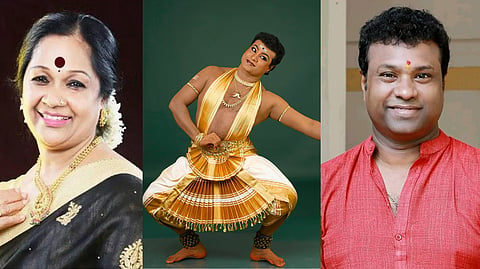
Though R L V Ramakrishnan is a renowned artist with a PhD in mohiniyattam, he was forced to raise his voice against discrimination on multiple occasions. General society in Kerala has always been reluctant to accept artists who do not belong to the high castes.
Classical art forms like kathakali, bharatanatyam, mohiniyattam, koodiyattam, chakyar koothu and Carnatic music have remained the domain for forward castes even 75 years after Independence. The practice of discrimination is prevalent more in districts north of Ernakulam, while temples in the south are more accommodating, says a Dalit artist.
Kerala witnessed a major controversy when the thantri of Thriprayar Sree Rama temple denied permission for a performance of Gurudeva Mahatmyam, a kathakali play depicting the life of Sree Narayana Guru, on the temple premises. This hurt the emotions of the Ezhava community, which worships the Guru as god. Most kathakali performers belong to the Namboothiri and Nair communities and the classical dance forms continue to be a no-go zone for lower castes.
Actors like Vinayakan have often revolted against the discrimination against Dalit artists in Mollywood.
Actor Manikandan Achary took to the Facebook, reminding Satyabhama that the age when elites decide what others should do is over. “We are humans. We are born and brought up in this land. We are artists and this is our identity. We will sing, dance and act. People who are interested in our performance will watch. The age when you decided on the role of others is over,” he wrote.
“Casteism and racist mentality exists in Kerala’s society and I have experienced it over the years,” says Dalit folk singer Praseetha Chalakudy.
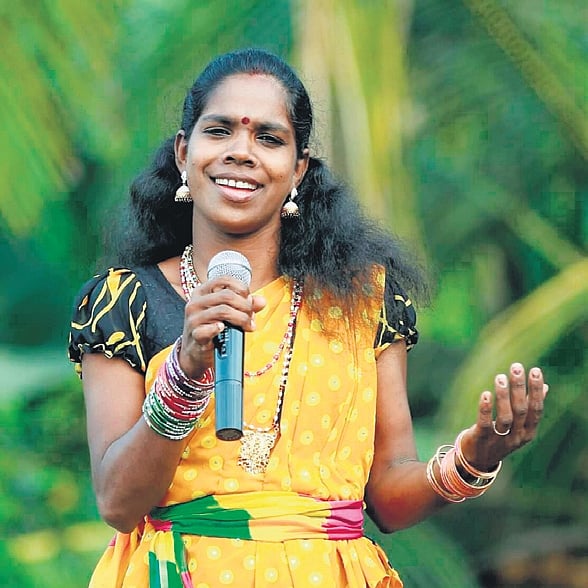
“I now have gained respect in society, but I earned it after much struggle. It is hard for a Dalit artist to find space in the cultural sphere. Even now people refer to my caste when hurling abuses on social media. Though I get better pay nowadays, folk singers generally are not treated on par with other artists,” she said.
“The question is how you judge an art performance - by talent or by complexion,” said political observer J Prabhash. “Our belief that casteism has been wiped out from Kerala society has been proved wrong. It was lying dormant. The resurgence of Hindutva has legitimised casteist mentality. It is against this context that casteist aspersions are returning to the society. It is disgusting that people are openly endorsing caste even 75 years after Independence. This indicates where we are progressing as a society. The experience of R L V Ramakrishnan proves that the Dronacharya syndrome, where the Dalit who enters domains held by elites are punished, still exists in the society. We have to defeat this mentality,” he said.
Most of the temples prefer percussion artists belonging to the Marar and Poduval communities to perform panchavadyam. Even Kerala Kalamandalam did not accept students from other communities to pursue percussion courses till recently.
A Nair, Biju Sopanam was denied appointment by Cochin Devaswom Board as only Marar or Poduval community members can be sopanam singers. “I was a sopanam artist at CDB’s Cheranalloor Bhagavathy temple from 2010. But in 2012, my application for a permanent post was rejected. I continue performing on stage but many temples deny me opportunity to sing in front of the sanctum sanctorum,” says Biju.
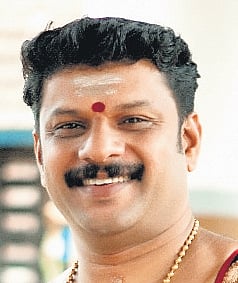
Chakyar koothu artist Elavoor Anil, who also belongs to the Nair community, says major temples do not allow him to perform on their premises as he does not belong to Chakiar community, which is a sub-sect of the Brahmin community. “I performed at Thiruvaloor Mahadeva temple in Ernakulam for 19 years. In 2016, the temple administration asked me to perform padakam instead of chakyar koothu. When I sought the reason, authorities said it was found in devaprasnam, the ritual to know the mind of the deity, that a chakiar should perform chakyar koothu,” he said.
Mansiya V P, a bharatanatyam dancer who renounced her Muslim faith fighting discrimination, struggles to find acceptance at temples as she has refused to convert to Hinduism. In March 2022, Koodalmanikyam temple in Thrissur cancelled her performance at the National Festival of Dance and Music as she failed to produce a certificate that she is a practising Hindu.
A native of Malappuram district, Mansiya renounced Islam after the community denied a burial place for her mother Amina, whose daughters are all dancers. Though she married a Hindu, Koodalmanikyam temple demanded that she should declare her religion to perform on its premises. As she refused, Mansiya’s programme was cancelled. Saumya Sukumaran, a Christian bharatanatyam dancer who married a Hindu was also denied the opportunity on religious grounds at Koodalmanikyam temple in 2022.

Instances of caste discrimination
Kalamandalam did not admit students belonging to lower castes for courses like kathakali, chenda and maddalam till the last decade
Actors in Malayalam film industry like Vinayakan and Manikandan Achary struggle to survive in the caste-dominated industry
2013 Permission denied for performance of Gurudeva Charitham kathakali at Triprayar Sree Rama Temple
Classical art forms like kathakali, koodiyattam, bharatanatyam, mohiniyattam, chakyar koothu remain a domain for upper castes
Temples prefer chakyar koothu performers from Chakyar community, a sub-sect of Brahmins
Artists belonging to Poduval and Marar communities selected to perform melam at temples
Only Marar and Poduval can perform Sopana sangee-tham in front of sanctum sanctorum
Dalit folk singers face discrimination at temple festivals. Payment lower than other art forms
Mansiya who renounced Islam and married a Hindu denied opportunity at temples as she has refused to convert to Hinduism
- Rights
Access to Water Is a Crisis for the Powerless

The Mahad Satyagraha – referred to as India’s first civil rights movement – was led by noted lawyer, social reformer, and Dalit leader B.R. Ambedkar who then took on the ‘upper’ caste people of the area who claimed the tank was private property. The ensuing legal battle lasted a decade. Dr Ambedkar won the case.
The fight for access to water resources, however, continues today across India.
The right to safe drinking water is recognised as a fundamental human right. In India, it is customary to greet a guest or passerby with a glass of water, though the way water is offered depends on your caste.
More importantly, though, how water is allocated and distributed comes down to a question of policy and governance, where it tends to follow the contours of socially-determined inequalities.
A 2018 NITI Aayog report states that India ranks 120 of 122 countries in the Global Water Quality Index. India has the largest reported groundwater usage in the world.
Social inequities in India and other parts of South Asia directly impact access to water, how it is allocated, distributed and consumed.
Climate change, along with oppressive and discriminatory social practices, makes a bad situation worse.
Marginalised groups are disproportionately affected by lack of attention to the social dimensions of water policy, its use and allocation that often perpetuate practices of untouchability and gender-based discrimination.
Who owns land and resources becomes critical to who can access water. This question is determined along lines of caste, class and gender inequalities.
Community movements working towards equitable access to water have been stymied by a lack of support by gram panchayats (village-level governance institutions) or by private investments which benefit wealthier farming communities with bigger landholdings.
North Gujarat, a semi-arid region in western India that relies on groundwater use, faces water scarcity due to the proliferation of tubewells.
Groundwater access becomes the preserve of the upper castes through the building of tubewells on private land, a form of access based on casteist social structures that limit land ownership among the lower castes.
This socio-economic status determines access to water and who uses more of the groundwater commons.
Tubewells have resulted in the drying out of shallow wells, giving rise to “water lords” who dominate consumption of water. This, in turn, forces poor farmers to rely further on them for water supply in an already exploitative relationship.
Alongside caste, gender also becomes a determinant of communities’ relationships with water.
Women are the face of water poverty in India. The responsibility of meeting families’ water needs in rural India falls squarely on them, exacerbated by dropping water levels and the perils of a changing climate.
Women are responsible for collecting, storing, and managing the water needs of households for cooking, bathing, washing, leaving them with little time to participate in the labour force. It also prevents young girls from pursuing education.
A 2019 study found that villages affected by water scarcity in Gujarat’s Bhuj district – a Muslim-dominated area – received less than five litres of water per person per day, falling significantly short of the UN-mandated minimum water requirement of 20 litres of water per person per day.
Erratic rainfall and negligence of the state Water Supply and Sewerage Board both produced this failure. This water is often saline and unfit to drink.
Where state supply of water is erratic, lower-caste villagers are forced to depend on tubewells owned by ‘upper’ castes or walk great distances to access public water supply.
About 71% of Dalit settlements in villages have no access to public water supplies. Discriminatory water practices in Gujarat’s villages disproportionately affect lower-caste women, subjecting them to extreme precarity and vulnerability to sexual abuse by ‘upper’ caste men.
This becomes more alarming because groundwater levels in South Asia are heavily impacted by salinity in coastal areas. Gujarat has the longest coastline in India and water from wells is already undrinkable like some villages in Jafrabad district where women are forced to walk miles to access safe drinking water.
Climate change inflicts disproportionate burdens on marginalised groups. Discriminatory practices in access to water continue through concerns of caste pollution – a belief among the upper castes that their ‘purity’ will be defiled if they come into contact with lower-caste people.
Efforts to decentralise water governance in Gujarat continue to meet resistance from ‘upper’ caste people for whom equity of access disrupts their monopoly over irrigation and agricultural uses. Maintaining control of water access gives upper castes an advantage over lower-caste people.
Such injustices remain marginal considerations for intervention by NGOs and state governments. The problem of access to public resources based on social difference thus needs to be addressed urgently by policy-makers.
Governments have failed to acknowledge social discrimination in the provision of basic amenities to marginalised communities which will grow increasingly vulnerable as climate change intensifies long-standing social disparities in wealth and resource use.
Improving public accountability in governance requires an understanding of the effects of the numerous disadvantages faced by marginalised communities.
With India’s summer approaching and water stress becoming a reality, poor and marginalised women bear the brunt of heat stress in the collection of water, a fact unrecognised by policymakers and insufficiently addressed in India’s Heat Action Plans.
Water scarcity and water insecurity are created through socio-economic and political inequalities. Socially just climate adaptation for water management can go hand-in-hand with an acknowledgement of the social power vested in local elites.
Generating institutional change from both above and below requires addressing the various barriers that prevent achieving human rights for the most vulnerable communities. It also demands political mobilisation towards overcoming social barriers in the same vein as the Mahad Satyagraha of 1927.
Giving everyone a say in decision-making and removing unequal administrative measures that prevent fair access to water — such as making tubewells a public good with parameters of equal access — can be pursued.
Legal provisions towards supporting water equality need to be made enforceable. Otherwise the idea of water justice remains a mere tokenism.
Prakash Kashwan isAssociate Professor of Environmental Studiesand Chair, Environmental Justice Concentration, MPP, at the Heller School for Social Policy & Management at Brandeis University. He is the author of Democracy in the Woods: Environmental Conservation and Social Justice in India, Tanzania, and Mexico (Oxford University Press, 2017) and the Editor ofClimate Justice in India(Cambridge University Press, 2022).
Originally published underCreative Commonsby360info™.
Lok Sabha Elections 2024: Skilled in Bamboo Artwork, Why This Small SC Community in Mirzapur is Struggling for Survival
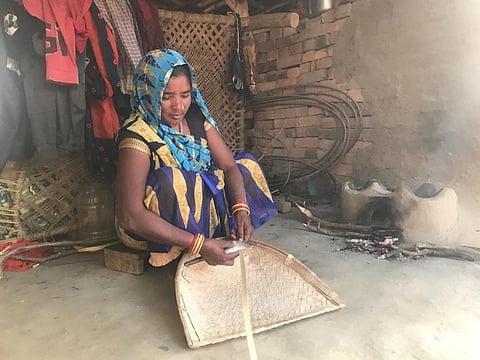
Mirzapur (Uttar Pradesh): Lofty promises and tall claims made during election campaigns turn out to be mere lip service for the Benvanshi Dhakar community in eastern Uttar Pradesh’s Mirzapur district who have been forgotten since long. People belonging to the scheduled caste (SC) group are so despised that they are not even permitted to work in agricultural fields as their touch will make the farm produce “impure”.
However, the bamboo products they make are used in worship rituals.
They produce a wide range of bamboo artworks like jhaua, bhauka, and tokdi (the bamboo baskets of different sizes), soopa (used in kitchens to separate husk and stones from food grains), and hand fans.
Despite the fact that their products are popular in India and abroad, they are highly marginalized and forced to live in extreme poverty.
After days of intense labor to come up with cutting-edge art, they earn a maximum of Rs 200, and that too, not every day. With Chinese invasion into the Indian market, these products are gradually losing sheen.
The community has a small population of around 10,000 people in the entire district. They can be found in tiny numbers in Amoi, Malua, Raikal, Kanhaipur, Rampur, Sant Nagar, and Patehra villages.
No Roti and Makan
Both Seema, 40, and her husband Samru, 45, are engaged in their traditional bamboo baskets (tokdi) to sustain themselves and their three small children. After three days of arduous work, they produce a large basket, which their only son — who is 15, sells for Rs 200 in the neighborhood market.
“People do not want to pay even the modest cost of our products. The prices we fix are nothing in this age of inflation. Sometimes we have to sell it at the input cost, which settles somewhere near Rs 150 because we don’t want to come back empty-handed,” the inhabitant of Newadhiya village in Patehara block told The Mooknayak.
Seema said they have to do so with a “bleeding heart” as returning without a penny means starvation at home.
Though Seema's fellow community members are small in number, supposedly making them politically insignificant, their sufferings are unimaginable.
“We (the wife-husband duo) can afford to sleep without food, and we have to do it very often. But as a mother, how can I see my children going to bed without food? No one can. They deserve noon-roti (bread and salt) — a bare minimum — at least twice a day, if not a rich and healthy diet,” said the visibly sad mother.
A few meters away from Seema, Mahdei was talking to other women of the village while seated on the earthen floor in front of her run-down, thatched house. While engaging in a casual chit-chat with this reporter, she got up, went inside her one-room hut, and pulled out a charpai (cot). With hesitation, she requested me to sit on it.
Despite persistent requests to sit on the same cot, she politely refused and ended up sitting on the floor. “We belong to a lower caste. How can I sit next to you on the cot even though you are nearly the same age as my son?” she smilingly said.
Asked how everything is, she shot back with wonder, “Do we even exist for the government and society at large? No one, not even journalists, ever comes to us. I am happy that someone acknowledged our presence and took the pain to reach this remote village to learn about our issues.”
The village, which has about 110 houses, does not appear to have benefited from any government programs or schemes. The residents here are landless. They don’t have a pucca house that should have been built on a priority basis under the Pradhan Mantri Awas Yojna (PMAY), which provides impoverished rural residents with Rs 1.3 lakh for the construction of a house.
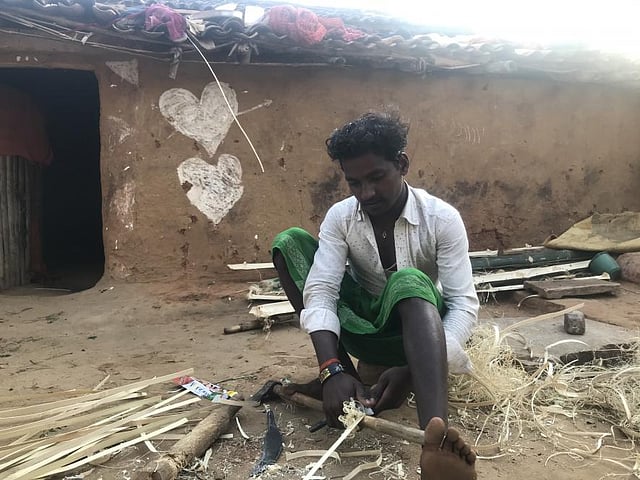
“We receive nothing from the government other than free ration. Whenever our products are not sold, we have to sell the wheat and rice we get (under the public distribution system or PDS) to raise money to meet other financial requirements,” said the weak and frail woman.
Along with her four boys, the 55-year-old too makes soopa and baskets. However, they barely make even Rs 100 a day.
“People often take our products through a barter system in exchange for food grains. Life is difficult,” she continued, with her face clearly showing dejection.
Opposite Mahdei’s house, Babu Nandan was busy making a bamboo tokdi on the other side of the road. He too joined the conversation, lodging a list of complaints of corruption and suppression.
“We applied for a house under the PMAY more than thrice, but to no avail. Our repeated requests to pradhan (village head) to push our applications landed on deaf ears. Every time we approached him, he asked us to submit documents but nothing happened so far. We are probably not statistically significant, which is why it is happening. Political leaders take us for granted. They believe that they will secure our votes in return for alcohol — which is distributed a night before the polling day,” alleged the 45-year-old man, narrating his ordeal.
With folded hands, he pleaded to take their cause to the government to ensure some aid for them. “What we need is a place where we can showcase our skills and sell the products. In the absence of government assistance, we are struggling for our survival and to keep this art form alive,” he added.
A Saga of Neglect
According to 28-year-old Vinod Kumar, members of his community had voted for the Bharatiya Janata Party (BJP), which is ruling the state as well as the Centre, in the 2019 elections with hope that it would do something for their upliftment.
When asked who they would pick in the current elections, he said no decision has been made in this regard so far.
“We generally go by the choice of the mainstream society here. We cannot go against the wishes of the influential ‘upper’ caste people here as we have to live and sustain our children,” he claimed, alleging no politician ever reached out to them for their support in elections.
“We are told that a particular party would win with or without our support and that it won’t matter whether or not we vote for it,” he said.
Changur, 70, a resident of neighboring Rampur village in Patehra block, and his three sons are engaged in the work to earn a livelihood. He said he struggles to earn Rs 1,000 a month.
“If our products are sold, we are able to eat,” he said when inquired about the work, adding, “Humke ee kaam karai se jutat haa taa khaat hain, naahi to naahi khaat hain (if our products are sold, then we manage to eat. Otherwise, we remain hungry)”.
He is the only person in his village who owns a one-room pucca house. “I got this house constructed with Rs 1.2 lakh I received from the government under the housing scheme,” he said.
The villagers claimed festive seasons help their business, and the flood of plastic products on the market has an adverse impact on their source of income.
“It has significantly reduced the demand for hand-made bamboo products,” they said.
“Threat of extinction looming large on our age-old profession because of the government’s neglect,” complained 30-year-old Suraj Prasad, claiming that they give bamboo life by employing their skills and making a variety of items out of it.
Making bamboo products involves many steps. First, it is cut into pieces along its length. Longitudinal pieces are again cut into thin slices. Now, it is left to dry for several days. Red and green hues are typically used to color the long and thin slices. Lastly, the slices are woven according to the items in a certain design.
“The procedure is labor-intensive and intricate, but the return is inadequate. As a result, a large number have abandoned the profession. Many of us now work as construction laborers, who, if hired, at least make more money than what we earn with these products,” he said.
The community women continue to use earthen stoves and are always at risk of respiratory illnesses. The much-marketed Pradhan Mantri Ujjwala Yojana (PMUY), which aimed at giving LPG connections to women of below poverty line (BPL) families, finds little meaning here.
The Swachh Bharat Abhiyan (Clean India Mission) does not seem to have improved hygiene and safety for the villagers who still defecate in the open in the absence of toilets. The mega sanitation drive was launched by Prime Minister Narendra Modi in 2014 to achieve an Open Defecation Free India by October 2, 2019.
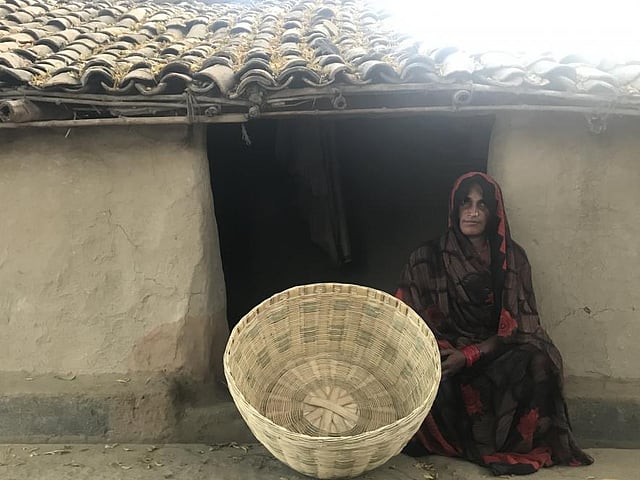
A Way Forward
The community is the most neglected and backward, even among the SCs, ranking at the bottom of all indicators.
Journalist Yogesh Kumar Benbanshi, who belongs to the community, gave an explanation of the social and economic backwardness.
“Our numerical significance is negligible. We currently number about 1 lakh people in the entire state. Because of illiteracy, lack of awareness, and extreme poverty, we don’t raise our voice to ask for our rights. As a result, we are unable to get the attention of the media, political figures, and the government,” he told The Mooknayak.
Kumar, a native of Unchdih in Prayagraj, is a second-generation educated man of his community. He could study law and journalism because his father works as an accountant with a private firm in Mumbai and gets a decent sum as a salary. He is one of the three youths in his village to have attended a university for higher education.
The efforts that could integrate his community with mainstream society — according to him — would be establishing a separate commission just like the one for SCs and STs, providing special financial aid to artists to help them expand their businesses, and making special arrangements for the education of children.
The Mooknayak spoke to all officials concerned with regard to the sufferings, economic challenges, and denial of government schemes of the Benvanshi Dhakar community, but none of them agreed to come on record.
The district magistrate too declined to make any comment — citing the model code of conduct, which is in place.
A Look at Statistics
India is the world’s second-largest bamboo cultivator, after China. With 136 species and 23 taxa, the evergreen perennial flowering plant has 13.96 hectares of land under its cultivation in the country.
The Government of India’s Ministry of Agriculture and Farmer Welfare estimates that 3.23 million tons of bamboo are produced here every year.
Nevertheless, the nation’s contribution to the world’s bamboo trade and commerce is barely 4%, despite its considerable production.
As artists continue to struggle to make ends meet, it appears that the Centre’s One District One Product initiative — which aims to select, brand, and promote at least one product from each district of the country for enabling holistic socioeconomic growth across all regions — is having no effect on the ground.
The artists continue to suffer to the extent of starvation despite the fact that their bamboo products have been included in the ODOP list and are put on display in Hunar Haats.
It would have been encouraging for these people if political parties had believed that the concerns of this group were significant enough to find a mention in their manifestos.
The Politics of Mirzapur
The country goes to polls to elect the 18th Lok Sabha from April 19 to June 1 (in seven phases). Voting on Uttar Pradesh’s 13 seats, which also includes Mirzapur, will be held in the seventh phase on June 1.
The Samajwadi Party (SP) on March 21 declared Rajendra S Bind as its nominee against ally Apna Dal (Kamerawadi) or Apna Dal-K in Mirzapur. However, both the SP and the Apna Dal-K are partners of the Congress-led Indian National Developmental Inclusive Alliance (INDIA) — which has been formed to take on the Bharatiya Janata Party (BJP)-led incumbent National Democratic Alliance (NDA).
The SP’s decision is likely to divide anti-BJP votes in the constituency. It came after the Pallavi Patel-led party “unilaterally” announced its candidates for Mirzapur, Phoolpur, and Kaushambi seats — all won by the BJP in the 2019 general elections.
Mirzapur Lok Sabha constituency, which is considered one of the important seats of eastern Uttar Pradesh, is presently held by BJP’s ally Apna Dal (Soneylal) or Apna Dal (S). The party chief, Anupriya Patel, has been the MP from this seat since the last two elections (2014 and 2019).
Currently, a minister in the Centre’s Modi government, she had won this seat with a huge margin of over 2 lakhs. The BJP has again left the seat for the Apna Dal (S).
All five assembly constituencies of the district are held by the NDA.
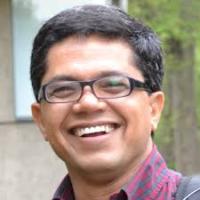








Comments
Post a Comment